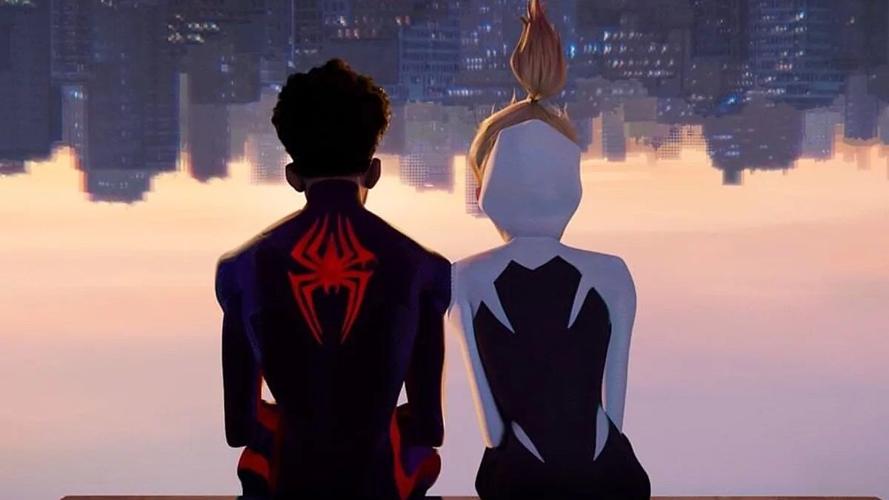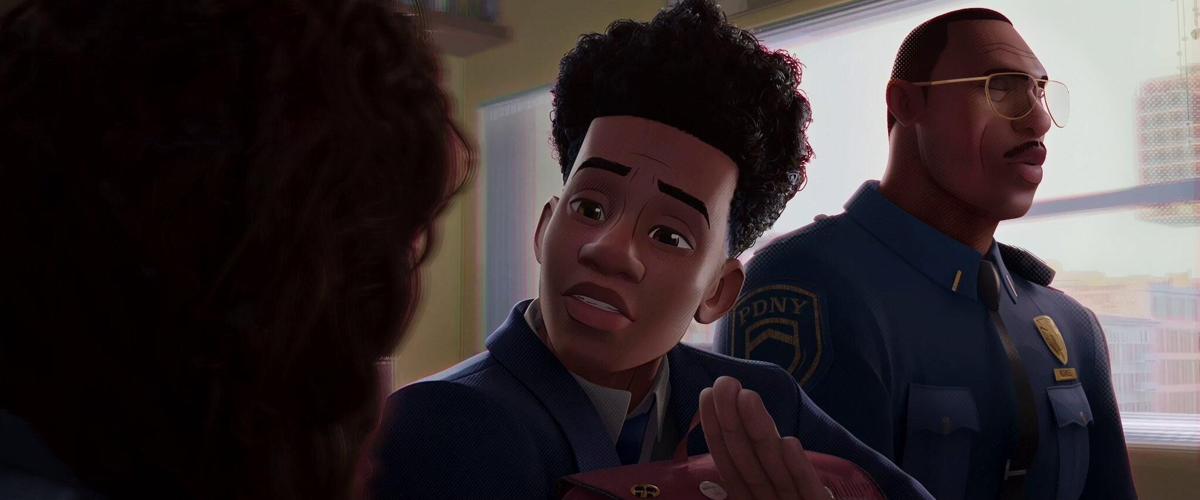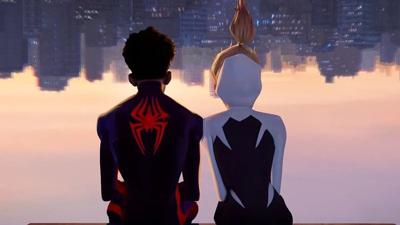At 140 minutes, this is the longest, American, animated film released theatrically. Admittedly, this film feels long with action sequences that go on forever. At times, it felt never-ending or not going to end at all, which is arguably what happened. This film doesn't have an ending. It has a cliffhanger, as it was designed to be a two-part story. There is a point where the film feels like it should end, after a triumphant moment, ending with a tone akin to The Empire Strikes Back (1980). However, it chose instead to conclude more on a downer like Avengers: Infinity War (2018). This wouldn't be a criticism if the ten or fifteen minutes leading up to it didn't seem to drag. The coda here really could've been pushed to the next installment, if only for pacing purposes, although the next installment could be pushing nearly 3 hours in length too.
Shameik Moore (Wu-Tang: An American Saga and The Get Down) voices Miles Morales, an Afro-Latino teenager, living in Brooklyn. When he's bitten by a radioactive spider, he becomes Spider-Man, a masked vigilante with super-strength, the power to stick to walls and the ability to shoot webs from his wrists, allowing him to swing far and fast, as well as catch large objects. He works along side police to stop criminals, but essentially he's a vigilante.

In the previous film, Miles discovers there are alternate universes or dimensions. In a lot of them, there are other versions of Spider-Man, a variety of them that are different genders, different ethnic backgrounds or even different species. In the 2018 entry, a machine created by Wilson Fisk opens a gateway to those alternate universes, aka the multiverse, which introduces Miles to a handful of other Spider-Men.
Hailee Steinfeld (Hawkeye and Bumblebee) voices Gwen Stacy, a female version of Spider-Man, called Spider-Woman. Her universe is dubbed Earth-65. She was pulled into Miles' universe where she fell in love with him. Yet, at the end of the previous film, she had to return to Earth-65. This film picks up a year or so later, and Gwen is part of a high school band. She's clearly depressed because she misses Miles. Her goal is to get back to him somehow.

There's a star-crossed lovers story occurring that's not explored beyond two people pining for each other. The majority of this film is both Miles and Gwen having issues with their parents. Miles' mom and dad are overprotective. They're not domineering. They're merely frustrated because they never seem to have enough time with him. They don't know that his vigilantism is taking up family time. Gwen's vigilantism is clashing directly with her father's job. Like Miles, her father is a police detective but Gwen's father is out to capture and arrest Spider-Woman, not knowing that it's his own daughter he would arrest.
Gwen compares her vigilantism to her father being a cop. She says her mask is the same as his badge, but that's not the positive comparison or even the glowing one that she thinks it is or perhaps what writers and producers Lord and Miller think. In the wake of the Black Lives Matter movement, police reform has become an important issue centering on the lack of accountability and oversight, which can result in abuses. Vigilantism is all about people acting without accountability or oversight. In Christopher Nolan's The Dark Knight (2008), he specifically made the point that Batman's mask is not the same as a police badge. Nolan's film even argues that they should be separated, which I believe is the correct argument. We can't have vigilantism and policing be the same.

Given the protagonist is Afro-Latino, it seemed like this film had an opportunity to address crime with a different perspective, a perspective that didn't include advocating for vigilantism. Sadly, we saw the result of vigilantes, such as with George Zimmerman and Kyle Rittenhouse. That's not something we should emulate. A different perspective might include tackling causes of crime, which would mean addressing poverty or other systemic issues. Instead, Miles and Gwen wish to be vigilantes or emulate a problematic police force. It's strange to think that a film about vigilantes could still be a kind of police propaganda. Yes, the heroes are vigilantes who have to run from the police, but, as Miles and Gwen demonstrate, their role models are cops and they are trying to emulate them.
This film's saving grace is the amazing animation. There is a variety of animation styles employed. The action is so fast, but it is effective. It's colorful and bold, as well as detailed and intricate, fusing different styles together, almost making a cinematic collage. Quite frankly, it's beautiful. It continues the techniques demonstrated in the previous film, which won the Oscar for Best Animated Feature, a deserved and dazzling accomplishment.

Oscar Issac (Dune and Star Wars: The Force Awakens) voices Miguel O'Hara, an Irish-Mexican version of Spider-Man. His universe is dubbed Earth-928. He's developed the technology to travel to different dimensions or traverse the multiverse. He does so to fix or repair the damage caused by Fisk's machine, which has resulted in anomalies or people landing in universes that aren't their own. Miguel has mapped out the similarities or commonalities between all the varieties of Spider-Man. Things that happen to all of them are called "cannon events."
If one has seen the MCU series Loki (2021), the cannon events are akin to the nexus events. For these spider-people, those cannon events often involve the death of loved ones. Miguel can monitor all the other universes and travel to them, meaning he can intervene in the cannon events, if he wanted. As convoluted as Loki and even Doctor Strange in the Multiverse of Madness (2022) got in terms of the plots, this one is perhaps less convoluted as it is hypocritical. Instead of preventing any interfering with the multiverse, this film wants us to be on the side of interfering. This might be a contradiction that's resolved in the next entry, but here it's just hypocrisy.

Just like in the last film, this one introduces more versions of Spider-Man, including a Black British Spider-Man who is inspired by Banksy and punk-rock named Hobie, voiced by Daniel Kaluuya (Get Out and Black Panther). There's also an Indian Spider-Man named Pavitr, voiced by Karan Soni (Strange World and Deadpool). Finally, there's a pregnant African American Spider-Woman named Jessica Drew, voiced by Issa Rae (The Hate U Give and Insecure). This film is being released during LGBTQ pride month, but there isn't an overt expression of a LGBTQ version of Spider-Man, which is a little disappointing.
Rated PG for animated action violence and some language.
Running Time: 2 hrs. and 20 mins.
In theaters.

















